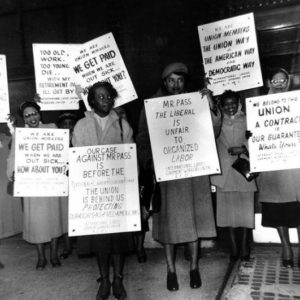As Women’s History Month wraps up, I want to take a moment to reflect on the women on whose shoulders we stand. In this moment of corporate power run amok, with each new headline demanding a response and with so much at stake, it’s important to remember that there is a long history of ordinary people challenging — and transforming — corporate power.
Rebecca Solnit, an author and activist whose words give us hope, shared this timely reminder on her Facebook page after the presidential election in the United States: “At junctures like this, we often talk about what we owe the young and the future, but someone spoke to me about what we owe the past: the people who fought so that many of us could vote, who fought for justice economic and otherwise, for the environment, for humane conditions, for things we cannot walk away from but owe to them, who fought for us, a good defense.”
In honor of this Women’s History Month, here are just a few of the activists we admire, are inspired by, and to whom we have a responsibility to keep challenging power. I hope you, too, find inspiration in the stories of bold organizers who envisioned a more just society, challenged existing power structures, and changed the course of history.
- Dolores Huerta who founded the National Farm Workers Association in 1962 with César Chávez and Fred Ross, Sr. This organization, which later became the United Farm Workers (UFW), trained and organized thousands of farm workers to demand better working conditions. As the co-founder of UFW, Huerta helped advance the kind of grassroots mobilization and corporate campaigning we employ today at Corporate Accountability International.
- Berta Cáceres, who co-founded the National Council of Popular and Indigenous Organizations of Honduras (COPINH). She fearlessly led a grassroots campaign that successfully pressured Sinohydro, the world’s largest dam developer, to terminate its contract for construction of the Agua Zarca Dam. But challenging such a powerful transnational corporation cost Cáceres her life. She was murdered in March of 2016, and organizations across the globe are calling on the Honduran government to conduct a full investigation into her killing.
- Women from the textile mills of Lowell, Massachusetts, who created the Lowell Female Labor Reform Association — the first labor union of women workers — in the 1830s. You can thank these women, and the others that followed, for weekends and limited workdays. Fed up with the abusive working conditions they faced, they campaigned for a 10-hour workday. With courage and learning as they went, they helped launch the workers’ movement in the U.S. by publishing and distributing pamphlets about conditions in the mills, going on strike, collecting petitions, and building coalitions with workers in other mill towns.
- Jasilyn Charger, a Lakota Sioux teenager who, along with her cousin and a friend, started the first camp that became the Standing Rock resistance movement. In 2015, the three teenagers formed a group on the Cheyenne River Reservation in South Dakota called the One Mind Youth Movement. They joined a local campaign challenging the Keystone XL pipeline, got trained in organizing, and then set up a small camp just off the Dakota Access Pipeline route. Their camp was the seed from which the movement against this pipeline grew. Charger and other activists created the International Indigenous Youth Council to empower youth and develop leaders in the American Indian Movement.
- Angela Davis, whose 1983 book Women, Race, and Class analyzed and exposed the exclusion of black and working women from the women’s liberation movement. She has been a leading advocate for prison abolition for decades and speaks and writes powerfully about the corporatization of punishment. In a recent speech, she reminded us, “When women rise up, that means that everyone rises up.”
- Leah Margulies, one of the founders of Infact — the organization that became Corporate Accountability International. Leah and the original leadership of our organization had the audacity to believe that ordinary people could come together and change the practices of Nestlé — the world’s largest food corporation. You know how the story goes from there. Today, 40 years later, we are implementing all the tools and strategies we’ve developed and honed to create transformational change and win corporate campaign victories that are saving lives and protecting our planet.
We hold these fierce campaigners in our hearts and minds as we continue advancing the systemic change we know the world needs.




